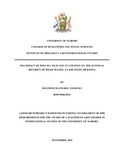| dc.description.abstract | This research project discusses the influence Hollywood films have had in a post 9/11 security era across weak states. In the aftermath of the September 11 attacks, terrorism has become more frequent in Kenya undertaken by Al Qaeda affiliate terror organization Al Shabaab. These attacks persisted and become more frequent and deadly in both scale and casualties after Kenya‟s incursion into Somalia in 2011 signifying enormous complexity of the terror organization with respect to structure, mode of attacks, and the area under its command in Somalia. After the attacks, the global arena equally witnessed a surge in the number of Hollywood productions featuring themes associated with a post 9/11 era. The study examined whether these films generated an environment where these terrorists would transform to become transnational actors whose actions increased the vulnerability of Kenya‟s national security. In order to measure this extent, the study operated under three objectives, firstly, to identify the dominant themes associated with national security in post 9/11 films, secondly, to identify threats facing weak states such as Kenya and finally to investigate the consequences these films had on the national security of Kenya.
The Uses and Gratification theory was used to explain these phenomena as it described the motives audiences have to receiving media content and their utility of the information acquired from various media platforms. The study acquired sampled 100 respondents and drew data that generated a positive relationship between post 9/11 film content and the national security of weak states. Cinematic illusions, ideas and motive were noted to easily replicated in their original form or otherwise modified to suit the crime intended. This is not limited to deviant group as government security organs also drew operational tactics from such films. The study therefore recommends an increase of Kenyan content that creatively incorporates challenges within the fight against terror into their themes as a way to mitigate the effects of western oriented films | en_US |



